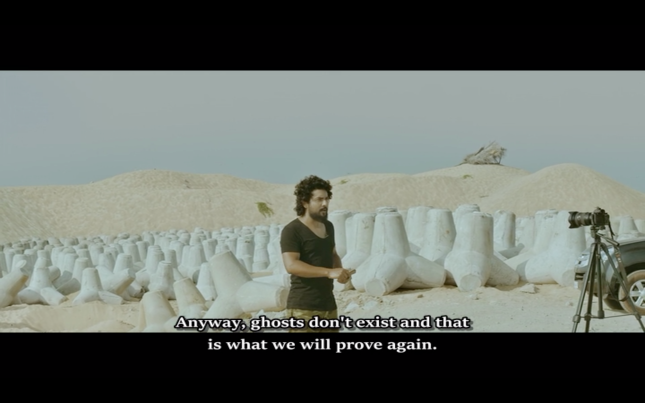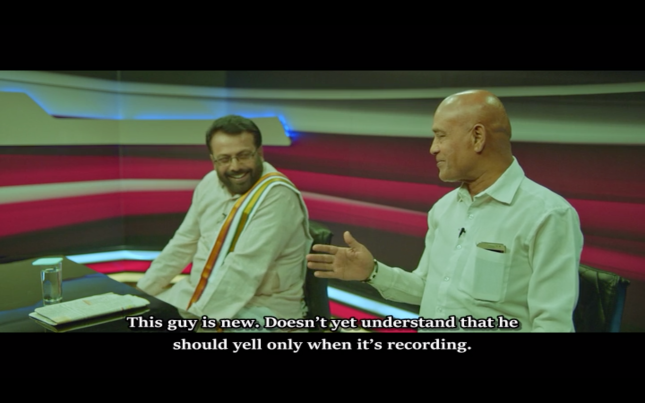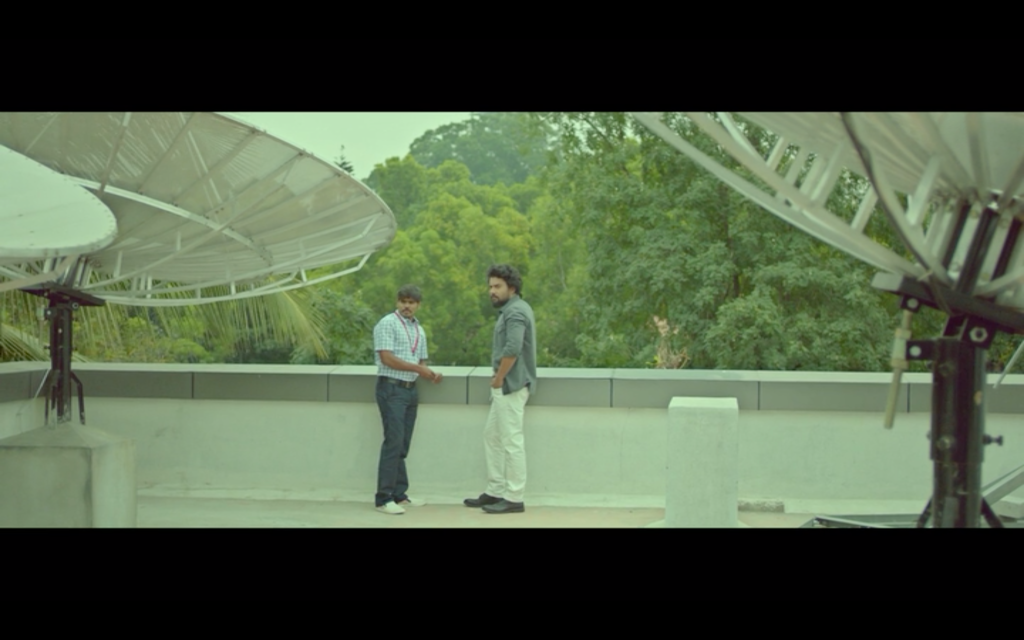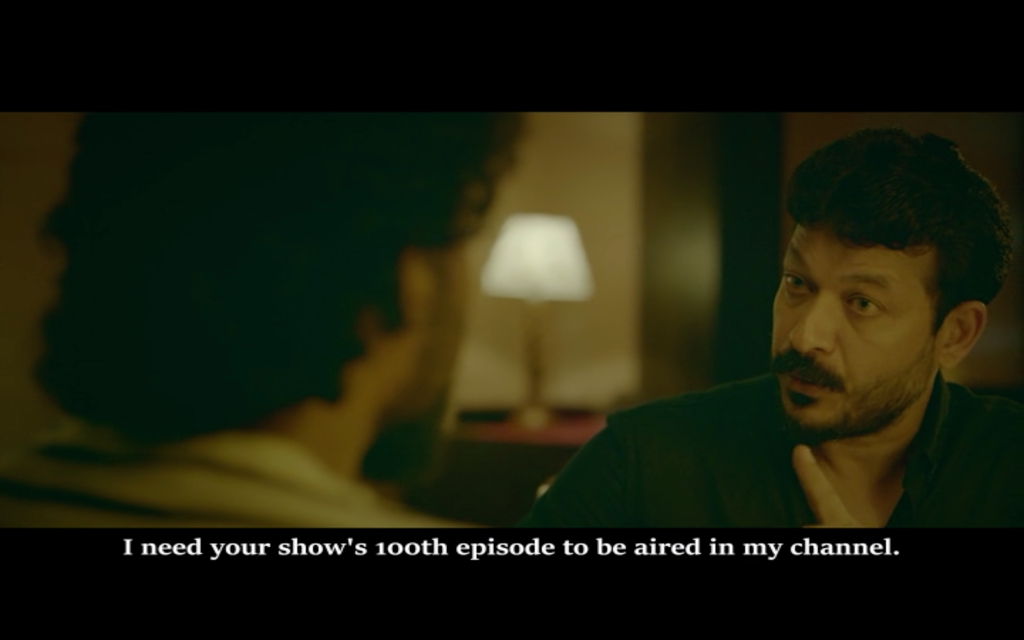
Arvind Sastry’s Alidu Ulidavaru is a psychological thriller that has some interesting horror overtones that make it a cut above the usual. There are quite a few creepy moments in the first half, but unfortunately the film runs out of steam near the end, and the climax suffers from some dodgy special effects. However, the basic idea is good and the story flows well with some interesting social commentary making Alidu Ulidavaru well worth a watch.
Sheelam (Ashu Bedra) is the host of a TV show called Kaarana that investigates ghost stories. We join him at the start of Case 99 as he is investigating a reportedly haunted guesthouse where a number of people have died. Sheelam is his own researcher and also his own cameraman, and throughout the course of the night he spends in the guesthouse we see him setting up remote cameras and even sending up a drone for some aerial shots. The point he wants to make is that there is no such thing as a ghost, and despite some scary moments, Sheelam is able to debunk the stories and prove every time that there is a human agency behind the reported hauntings.
Sheelam works for TV5, where his boss (B Suresh) is only concerned about ratings and wants to know what he will do for his 100th case – sure to be a hit for the TV station. At the same time, rival network boss Rajeev (Arvind Rau) has been set an ultimatum – improve ratings or lose his job, so he’s out to poach Sheelam to boost his audience numbers. But Sheelam has other problems too. His girlfriend, self-defence instructor Amrita (Sangeetha Bhat) wants him to give up ghost-hunting to get her parents approval for marriage. It seems strange that her parents are happy with her day job (teaching women how to fend off attackers), and yet seem to baulk at the idea of a TV presenter son-in-law, who has a good steady income and a popular fan base. But when Sheelam and Amrita are set upon by a group of thugs, her father blames Sheelam and his job, although there really isn’t any corroborating evidence. What’s great here is that Amrita gets to fight alongside Sheelam and show off her self-defence expertise in a real-life application of her skills. But overall the relationship doesn’t feel particularly real, mostly because Sheelam and Amrita are awkward in their scenes together and have little chemistry. Their exchanges frequently appear stilted and there doesn’t seem to be any passion in their relationship at all, which makes some of the scenes later on feel forced and unlikely because the underlying relationship hasn’t been developed in a meaningful way.





Sheelam also gets drawn into a live dispute with Guruji (Dinesh Mangaluru), a colleague at the station who presents a spiritual counselling show. While the two are friendly, they have quite different philosophies on life and their conversations are used as a way to try and draw out theories on spiritualism and the conflict between science and belief systems. What works well in these scenes is the glimpse into the world of TV chat shows. I’ve seen that India has a lot of these ’talking head’ shows where various people appear to shout over each other and argue about political and social issues of the day. I’ve always found them baffling, and more like WWF where it’s all a show for the punters rather than any attempt at meaningful discourse and according to this film, I’m totally correct! Here, the arguments are shown to be all completely contrived, with the presenters actually complimenting each other on inventive insults and clever put-downs during the ad breaks. Adding controversy is purely a device to increase ratings and Arvind Sastry gets this obsession with audience numbers and rating across well as we see the various machinations that go on behind the scenes to ensure ‘the numbers’ are kept high.
The second half of the film looks at what happens when Sheelam goes to investigate a supposedly haunted house where a number of people have recently died. The ideas here are really clever and initially well presented, but later on the special effects don’t work well which derails the narrative just when it needed to be sharp and well presented to achieve the required effect. There is also some dodgy medical diagnosis which is always frustrating since it seems to me to be used as a cop-out, when better writing could have produced an alternative solution. But regardless, the themes of jealousy and the sacrifice of morals to ensure good ratings for the TV show are well presented. I also liked how Arvind Sastry tries to illustrate the emotional burdens of trying to reconcile career, relationships and ethics with each other and how these impact on health and wellbeing. These are complex ideas and themes that for the most part he gets across well even if the final conclusion is rather less satisfying. It’s still a good attempt and the story is compelling as a result.
I did find Ashu Bedra to be rather stiff in his portrayal of Sheelam. I’d expect someone with his ghost-busting tendencies to be either wildly enthusiastic or else just a bit nerdy, and he isn’t any of these. Instead he basically comes across as just another reporter doing his job. There wasn’t any of the passion I expected – either for his chosen profession or for Amrita, and not even for all the various gadgets he uses in the course of his investigations. His lack of emotion makes it difficult to connect with the character, and hard to feel much empathy with his predicament. The problems he has to deal with in the second half really needed a more emotional portrayal to be effective and this is part of the reason why the film starts to lose steam by the climax. The rest of the cast are all fine. Sangeetha Bhat doesn’t have a lot to do, but Arvind Rau and B Suresh fare much better as the two rival TV bosses. Atul Kulkarni is good as the mildly lecherous police officer investigating suspicious deaths at the haunted house while Pawan Kumar makes an effective appearance as the owner of the haunted house
Aside from those special effects towards the end, the film looks good and there are some genuinely eerie moments enhanced by excellent use of lighting and camera angles. The background music from Midhun Mukundan is perfectly evocative and works well to add atmosphere to the narrative. I like how there is a good contrast between the artificial world of TV5 and Sheelam’s own reality, which ironically is all about unmasking fraudulent spiritual activity. If only there had been the emotion and sense of drama and theatricality that was needed to ensure the characterisations matched the intensity of the storyline the entire film would have worked much better. However, the uniqueness of the story and the blend of horror and intrigue make for a better than average watch and it will be interesting to see what Arvind Sastry come up with next. 3 ½ stars.





























































